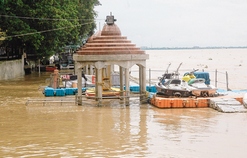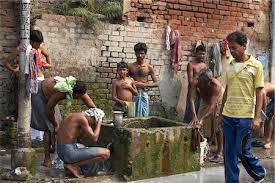If you’re in the Northern Hemisphere, you’re probably aware that it’s been quite hot. This summer, North India has been no exception, grappling with relentless heat waves that are becoming increasingly unbearable and life-threatening. From record-breaking temperatures to devastating impacts on daily life, the heat is no longer just a discomfort—it’s a clear sign of a deeper, global issue.
Record Heat Waves: A New Normal?
This year, we’ve witnessed the earliest heat wave on record in Greece, the tragic loss of lives among Muslim pilgrims during the Hajj due to extreme heat, and unprecedented temperatures from Bangkok to Barranquilla. Here in North India, temperatures soared to record highs, creating a dangerous combination of extreme heat and humidity that has left millions struggling to cope.
According to reports, by the end of May, over 1.5 billion people worldwide experienced at least one day with a heat index above 39.4 degrees Celsius, a threshold considered life-threatening by the United States National Weather Service. North India has been particularly hard hit, with temperatures frequently surpassing 45 degrees Celsius, affecting not only human health but also agriculture, water supplies, and daily activities.
The Climate Crisis: A Global Divide
The impact of these heat waves illustrates a growing global divide. In wealthier regions, people can often rely on air conditioning and better infrastructure to stay safe during extreme heat. However, in countries like India, many people don’t have these luxuries. Poor labourers, who must work outdoors to earn their livelihood, are especially vulnerable, with little means to protect themselves from the searing heat.
This disparity is echoed in a recent report by 57 scientists, which highlighted that human activities were responsible for 92 percent of the warming observed last year. As global temperatures continue to rise, the consequences are disproportionately felt by those least equipped to adapt—predominantly in the Global South.
Voices from the Ground: A Sense of Helplessness
In the face of these relentless heat waves, there is a growing sense of helplessness among many Indians. A World Risk Poll Resilience Index found a significant increase in the number of people who feel they can do nothing to protect themselves and their families from future disasters. This feeling of powerlessness is a stark reminder of the urgent need for action and support.
Nancy Hey from the Lloyd’s Register Foundation pointed out that the poorest households are disproportionately more likely to have lower resilience scores. Additionally, gender disparities mean that women often face even greater challenges in coping with the impacts of climate change. Empowering women and improving the resilience of vulnerable communities must be at the forefront of our climate interventions.
Pope Francis and the Call for Action
In light of these challenges, it’s imperative to heed the calls for action from global leaders like Pope Francis. At the recent G7 summit, he emphasized the moral responsibility to address the climate crisis, highlighting the urgent need for international cooperation and solidarity.
“Our planet is trying to tell us something,” U.N. Secretary General António Guterres warned. “But we don’t seem to be listening.” Pope Francis echoed this sentiment, urging world leaders to prioritize the environment and take meaningful steps to reduce greenhouse gas emissions. His message resonates strongly with the situation in India, where the consequences of inaction are felt so acutely.
The Path Forward: Building Resilience and Hope
As we face these unprecedented challenges, building resilience is crucial. This means not only addressing the immediate impacts of heat waves but also tackling the underlying causes of climate change. Investments in sustainable infrastructure, renewable energy, and education can help communities adapt and thrive despite the changing climate.
Empowering local communities, particularly women, and ensuring equitable access to resources and support is essential. While political developments in some parts of the world may seem discouraging, it’s vital that we remain committed to advocating for policies that protect our environment and promote social justice.
A Call to Action
The extreme heat waves hitting North India are a stark reminder of the global climate crisis.
It is high time that the climate crisis enters our political discourse. The ruling dispensation as well as the opposition benches should remove their ideological blinkers and get together to address this very real issue.
We must listen to the warnings, take immediate action to reduce emissions, and build a more resilient and equitable world. By doing so, we can protect the most vulnerable among us and ensure a sustainable future for generations to come. Pope Francis’s call for solidarity and action at the G7 is a timely reminder that in the face of a global challenge, we must come together to find solutions.
FRANK KRISHNER IS A WRITER, JOURNALIST, INDEPENDENT COMMUNICATOR AND A WELL KNOWN MEDIA PRACTITIONER.



